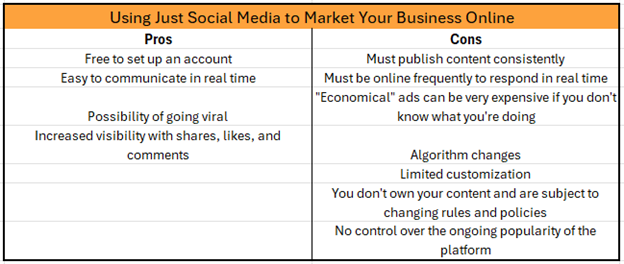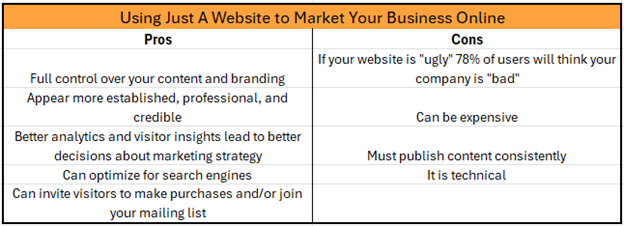5 Compelling Reasons You Need a Website and Not Just Social Media

Having an online presence is essential for any business. Although social media offers excellent opportunities for engagement and reach, it really shouldn’t be your only online strategy. If you’re pursuing long-term success, you need a website. And it’s because of your long-term success you must consider why you need a website and not just social media.
A website provides a foundation that social media alone simply can’t match. But keep in mind that doesn’t mean you should ditch social in favor of a website. It just means that each has it’s strengths.
Once you understand each of their strengths, you’ll be able to create an online strategy that best supports your business now and where you plan to go in the future.
Benefits & Limitations of Using Just Social Media to Market Your Business Online
I like to look at all sides of an issue before making a decision – especially when it comes to my strategy for the long-term success of my business. Although back when I started my entrepreneurial journey, I wasn’t so discerning and made a ton of mistakes. I don’t want you to struggle as much as I did, so let’s take a peek at the pros and cons of just using social media platforms to grow your business.
Starting with the good stuff:
It’s FREE! When you’re just starting a business or testing a proof of concept, having a FREE avenue for marketing can be a real benefit. You can create an account on Facebook, Instagram, or LinkedIn without paying a dime.
Many would also argue that advertising on these social media platforms is quite affordable compared to traditional marketing, but I don’t agree. I’ve seen too many people believe this is the case and then spend thousands of dollars on ads with little to no revenue generated.
With social, it’s very easy to communicate with your audience in real time. You can answer comments, messages, and any other feedback instantly. This quick communication can really help you build a loyal following because you’re helping them feel seen and valued.
Then there’s always the possibility of something you post going viral. But just shares, likes, and comments can all increase your content’s reach without something going viral.
Now it’s time to take off the rose-colored glasses and look at the other side of relying on social media alone to grow your business.
Social media platforms update their algorithms frequently. I don’t know if you’ve experienced an algorithm update yet, but what I’ve found is you can’t predict what an update will do or when it will happen. And, for me and my clients, it’s yet to be a good thing. What usually happens is a sudden drop in visibility. So, it can be really challenging to maintain your marketing results on social.
Another frustrating thing about social media platforms is they have limitations on customization. Everyone’s posts start looking the same because it’s really challenging to fully express your business’s personality or maintain your brand’s look and feel. I’m not saying there’s no customization – just that it’s limited.
The biggest drawback to relying solely on social if your goal is the long-term growth of your business is that the platform owns your content. It decides who gets to see it on their feed and how you can display it. And just like the platforms update their algorithms, they also update their rules and policies which can change without notice. Your account can get suspended, the platform can experience an outage, and you can lose your content and audience.
Then there’s the ongoing popularity of each platform you post to. Just because you’ve carefully selected the social platforms you’re posting on, doesn’t mean they’ll always be your best places to post.
Here’s a chart to help you see the pros and cons of using just social media to market your business online:

Now that you can see the pros and cons side by side, I hope you’re beginning to understand why you might need to have another strategy for your online marketing besides social media.
And, in my opinion, a website is what you need.
Benefits & Limitations of Having Just a Website for Your Business
Now it’s time to take a look at what is and isn’t great about having just a website as your online marketing strategy for your business.
Starting with the good stuff:
When you have a dedicated website for your business, you’ve got full control over your branding and content. In other words, you control everything about it – how it looks, what it says and doesn’t say, and how it’s structured.
This allows you to create and maintain a consistent brand image across all of the touchpoints on the site. And it’s this consistency that can foster trust and recognition with your audience. This ultimately helps you appear more established, professional, and credible.
(This doesn’t mean you’re stuck with the first incarnation of your website forever. You can and should rebrand as your business grows.)
When you think about your website from your customer/client’s perspective, they want your website to provide the information they’re looking for about your business, products, and/or services. A well-designed website, that’s easy to navigate tells everyone who sees it that you’re serious about your business.
(An interesting fact is 75% of users judge a company’s credibility based on its website design. Fascinating, right?)
One of the most important things about having a website is you have better analytics and customer insights. Google Analytics is a free website tool that can give you incredibly detailed insights into your website. You can discover things like which pages people visit, how long they stay, and which country they’re located in.
And when you have data like this, you can make better decisions about how to improve your website and marketing. For example, if you notice that certain pages on your website aren’t getting visited, you can adjust the pages and add internal links to them.
My absolutely favorite part about having a website for each of my businesses is SEO (search engine optimization).
(Look at what SEO was able to accomplish for one of my clients and you’ll get a feel for why I like it so much.)
When you optimize your website for search engines, you’re using a strategy that can help you get more organic traffic. I think of organic traffic as people who stumble upon your site because they’ve found you by Googling something your business offers or talks about. The bonus here is that rather than just randomly showing up in someone’s feed hoping they’ll click, with SEO you know that people who arrive at your site by Googling are already interested in your business!
Then after you’ve got people visiting your website, they’re more likely to buy from you or join your mailing list. Either way, you now have a way to contact and nurture them into becoming and/or staying customers or clients.
Now it’s time to take off the rose-colored glasses and look at the other side of relying on a website to grow your business.
Developing a professional website is not free. You’ll need to purchase your domain registration, web hosting, and maybe design. Then maintaining and updating a website also requires ongoing expenses for hosting, domain renewal, security, and technical support.
And, yes, technical support implies you can have challenges with a website. Some of the most frustrating can include things like updating the site’s software, downtime, and security vulnerabilities.
To have a vibrant website that attracts potential clients/customers, you must regularly create new content for it – just like for social media.
SEO is another layer of expertise that most business owners don’t have, so it’s often another expense to consider.
If you’re not tech-savvy, then these can seem like really big issues. But what I want you to keep in mind is there are millions of business websites out there and not all of them are for giant corporations or are led by a tech genius. If it’s time for you to get a website, you can definitely figure out how to get one. (And, yes, if you’d like, we can help you figure it out.)
Here’s a chart to help you see the pros and cons of using just a website to market your business online:

Now that you can see the pros and cons side by side, I hope you’re beginning to understand why you might need to have another online marketing strategy besides a website.
How Websites and Social Media Work Together
Maybe you’ve already put the pieces together, but just in case you haven’t let me spell it out. You need a website and not just social media as much as you need social media and not just a website. When you combine the two you can create a powerful online presence.
Here are 5 examples of how your social media and website can support each other.
Driving Traffic to Your Website
When you share your website content on social media, you can significantly increase traffic to your site. In essence, you use the visibility and reach social media can provide to improve the visibility and reach of your website.Enhanced Engagement and Interaction
Since social media allows real-time interaction, you can use these interactions to direct your followers to your website for more information, products, or services. This can encourage casual followers to become loyal customers who regularly visit your site.SEO Benefits
When you promote your website content on social media, there’s another benefit. You create backlinks. And backlinks improve your site’s SEO.Improving Content on Your Website
Although not as thorough as the analytics available on a website, media platforms offer insights into audience behavior and preferences through their analytics tools. When you take the time to analyze your social metrics you can more quickly identify what resonates with your audience. And this information will help you refine both your website’s content and user experience to meet your audience’s needs and interests.Greater Visibility
You can also use social media as part of your campaigns to nurture your followers, customers/clients, and people on your mailing list. This helps your business appear to be everywhere and always there, so it remains top of mind.
Hopefully, you’ll agree that these examples are 5 compelling reasons why you need a website and not just social media for the long-term success of your business. Combining both gives you a strong online strategy that leverages the best of each. Your website offers detailed information, robust analytics, and SEO benefits, while social media drives traffic and engagement in real time.
